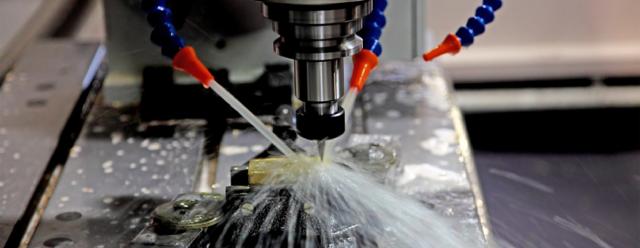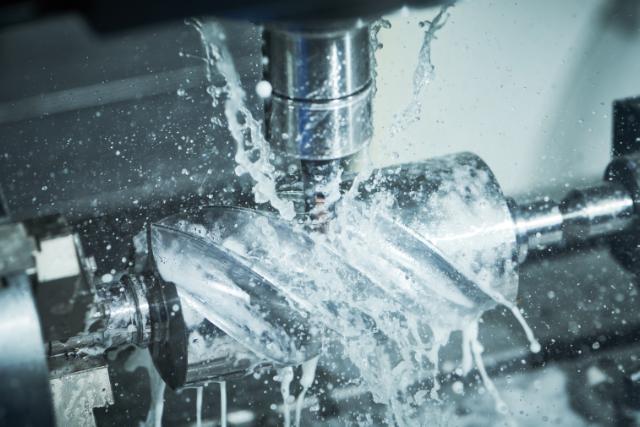Metal Working Fluids
Metal Working Fluids and Lubricants play a vital role in various machining operations
Metal working fluids play a vital role in various machining operations by reducing friction, dissipating heat, and improving tool life. The formulation of metal working fluids involves the careful selection and incorporation of lubricants such as ESTILUBE and ESTIMOL® fatty acid esters.
ESTILUBE and ESTIMOL® are fatty acid esters derived from renewable sources such as vegetable oils, making them an attractive choice in the context of sustainability. These esters possess unique chemical structures that contribute to their exceptional lubricating properties. The long hydrocarbon chains of fatty acid esters provide a protective film on metal surfaces, reducing friction and wear during machining processes.
ESTILUBE and ESTIMOL® esters can be combined with other lubricating agents, such as extreme pressure additives and anti-wear agents, to enhance their performance in specific machining operations.

The unsaturated ESTILUBE grades such as ESTILUBE L320, ESTILUBE L360, ESTILUBE L370, and ESTILUBE PTO are especially suited for application as base oils or lubricant additives in metal working fluids.
ESTILUBE P 1150 is a self-emulsifying ester with extremely high lubricating properties. It is used in the metal working fluid concentrate, when good lubricity is needed for example by machining of aluminium.
Moreover, the excellent thermal stability of the saturated ESTILUBE grades allows them to withstand high temperatures without degradation. This is especially important in non-water miscible metal working fluids, where the temperature may get very high around the deformation zone.
ESTILUBE L210, ESTILUBE L245, ESTILUBE L290, ESTILUBE L300, ESTILUBE L360S, and ESTILUBE L400 are applied in temperature-stable lubricants with low tendency to carbon formation such as stamping fluids and minimal lubricants.
Get in touch about information and samples
We make it simple and hassle-free! We're here to provide the best possible customer service!
Just let us know what you need, and we will ensure fast and reliable delivery.
Don’t hesitate to reach out! Contact us here
Need expert advice ?
Whether you have questions about specific products, formulations, or specialized services, we’re ready to advice you through the process.
Feel free to reach out with any inquiries or special requests.
Contact one of our experts here
ESTIMOL® esters are self-emulsifying polymer esters with very high lubrication properties in aqueous media.
ESTIMOL TE 2000 N is based on nonionic complex ester chemistry. ESTIMOL TE 2000 N is applied as a lubricant additive in water-miscible metal forming lubricants. ESTIMOL TE 2000 N may be combined with anti-wear additives or EP additives to enhance the performance.
ESTIMOL CE 960 NN is an anionic, polar ester and forms soaps with alkanol amines. Such soaps provide emulsification, lubrication, and corrosion protection properties in the metal working fluid formulation.
ESTIMOL CX-N is a high-performance lubricant additive package for formulation into metal working fluid concentrates or for application as a tank-side additive.

Emulsifiers play a crucial role in metal working fluid formulations by facilitating the dispersion of lubricants, corrosion inhibitors, and other additives in the fluid system.
Among the various types of emulsifiers, nonionic emulsifiers have gained prominence due to their versatility, stability, and compatibility with a wide range of metal working fluid components. They offer excellent emulsification capabilities, enabling the formation of stable oil-in-water emulsions that disperse evenly throughout the fluid. This emulsion stability ensures consistent lubrication and protection for metal surfaces during machining processes.
Commonly used nonionic emulsifiers in metal working fluid formulations are ESTISURF 480, ESTISURF 600, ESTISURF 970, ESTISURF RE 100, ESTISURF 1618/3, and ESTISURF 1618/7. They can emulsify a wide range of oils, including mineral oils, synthetic esters, and vegetable-based oils.
From an EHS perspective, ESTISURF nonionic emulsifiers are advantageous due to their lack of CLP labelling.

Water miscible metal working fluids are extensively used in machining operations to provide lubrication, cooling, and corrosion protection. However, the presence of water in these formulations can lead to the formation of foam, which hinders their performance and efficiency. To address this issue, DEFOAMERS are commonly employed in the formulation of water miscible metal working fluids. Foaming in metal working fluids can have several negative effects.
First, excessive foam can interfere with the cooling process, reducing the fluid's ability to dissipate heat generated during machining operations. This can lead to increased temperatures at the cutting zone, potentially causing thermal damage to the tool and workpiece.
Second, foam can impair lubrication by preventing direct metal-to-metal contact, resulting in increased friction and wear. Additionally, foam can interfere with the proper functioning of metal working fluid systems, such as pumps, filters, and spray nozzles.
DEFOAMERS are chemical additives specifically designed to control and eliminate foam in high performance metal working fluids.
Several DEFOAMER products from ESTI CHEM are commonly used in water miscible metal working fluid formulations. They are highly effective defoaming agents due to their low surface tension and excellent spreading ability. They show good persistence and little tendency to separate from the fluid unlike many other defoamers such as emulsified silicone oils. DEFOAMER products from ESTI CHEM are without negative effect on subsequent surface finishing such as painting.
DEFOAMER 45-N, DEFOAMER 100 FI, DEFOAMER 700 and DEFOAMER 1000 are applied in the metal working fluid concentrate or as tank-side additives.
Four reasons to do business with us
More than 30 years of experience
ESTI CHEM has more than 30 years of experience in the development of sustainable products based on natural raw materials.
We help customers transforming their products to fit the needs of the future.
Short time delivery and a reliable supply chain
ESTI CHEM knows the importance of timely access to raw materials.
A broad range of our products are available from stock, and our supply chain team is ready to assist you.
We deliver samples, technical information & support
Development of new formulations can be a bumpy road with many challenges on the way.
ESTI CHEM will assist you with product samples, technical information & support during the development process
Certified ISO 9001 - 14001 – 45001 – RSPO – Rated ECOVADIS Platinum
ESTI CHEM is certified according to ISO 9001, 14001, 45001, and RSPO.
We are Platinum-rated by Ecovadis on sustainability.
Our processes are well-documented and focused on providing service and support to our customers.
Get in touch
We appreciate your interest in our products and services.
Let us get back to you
Use the contact form and we will strive to make a reply in 24hours.

